
The Norton Motorcycle Company is a brand of motorcycles headquartered in Solihull, West Midlands,, England. For some years around 1990, the rights to use the name on motorcycles were owned by North American financiers. Currently it is owned by Indian motorcycle giant TVS Motor Company
Triumph Engineering Co Ltd was a British motorcycle manufacturing company, based originally in Coventry and then in Meriden. A new company, Triumph Motorcycles Ltd, based in Hinckley, gained the name rights after the end of the company in the 1980s and is now one of the world's major motorcycle manufacturers.
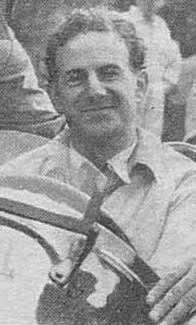
Roger Dennistoun Poore was a British racing driver, financier and entrepreneur. He became chairman of Norton Villiers Triumph (NVT) during the final years of the old British motorcycle industry.

The Triumph Thunderbird is a British motorcycle that was introduced by Triumph back in 1949 and produced in many forms until 1966. The name was used three more times for new and distinct Triumph models.

The Triumph Trident and BSA Rocket 3 was a technically advanced, high-performance roadster motorcycle made by Triumph Engineering and BSA from 1968 to 1975, and sold under both the Triumph and BSA marques. Alongside the Honda CB750, and later the two-stroke Kawasaki triples, it brought a new level of sophistication to street motorcycles, marking the beginning of the superbike era. The Honda CB750 overshadowed the Trident to be remembered as the 'first superbike', in spite of the Triumph Trident actually debuting before the Honda by a few weeks.

The Triumph Bonneville is a standard motorcycle featuring a parallel-twin four-stroke engine and manufactured in three generations over three separate production runs.

Associated Motor Cycles (AMC) was a British motorcycle manufacturer founded by the Collier brothers as a parent company for the Matchless and AJS motorcycle companies. It later absorbed Francis-Barnett, James, and Norton before incorporation into Norton-Villiers. Henry Herbert Collier founded Matchless as a cycle company in 1878. His sons Henry (Harry) and Charles (Charlie) joined him and the name was changed to H. Collier & Sons.
Norton-Villiers was a British motorcycle manufacturer formed in the 1960s following the collapse of AMC. With the general decline of the British motorcycle industry, under a British Government initiative it was later combined with the remnants of BSA Triumph to form Norton-Villiers-Triumph.

The Norton Commando is a British Norton-Villiers motorcycle with an OHV pre-unit parallel-twin engine, produced by the Norton Motorcycle company from 1967 until 1977. Initially having a nominal 750 cc displacement, actually 745 cc (45.5 cu in), in 1973 it became an 850 cc, actually 828 cc (50.5 cu in). It had a hemi-type head, similar to all OHV Norton engines since the early 1920s.
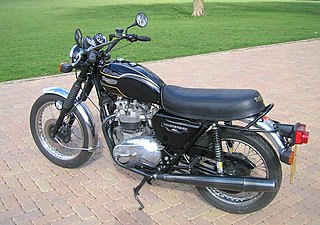
The Triumph TR65 Thunderbird is a motorcycle made by the Triumph worker's co-operative at the Meriden factory from 1981 to 1983. The TR65 was a reintroduction of the Triumph Thunderbird model name first used on the original 6T Thunderbird of 1949. A short stroke model, the Daytona 600 was designed in 1983 but not produced.
Leslie Frederick Harris was an English businessman and motorcycle enthusiast who resurrected the Triumph Bonneville for a few years in the 1980s. Born in 1939, he was described as the "saviour of the British motorcycle industry". Invited to Buckingham Palace and the Houses of Parliament, in 1987 he was visited by the Prime Minister Margaret Thatcher. He died in February 2009, aged 69.
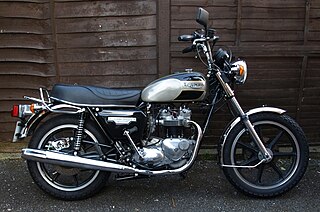
The Triumph Bonneville T140 is a standard motorcycle with a 750 cc (46 cu in) capacity engine that was designed and built by Triumph Engineering at Meriden near Coventry.
Brian Jones was a motorcycle designer and engineer born in Gloucester, United Kingdom in 1928. Notable for his contribution to the original design of the Triumph Bonneville, he died in Coventry, on 4 March 2001.
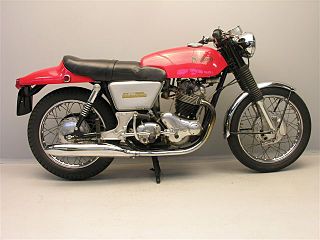
The isolastic frame, designated by Norton as GlideRide, used a system of engine-to-frame mountings incorporating rubber bushes to isolate the vibration of the vertical twin engine from the frame and rider. The isolastic frame was developed for use with the Commando inclined engine, whilst the Featherbed frame continued in production for the Mercury with a softer-specification 650 cc vertical-engine until 1970.
BSA Company Limited is a motorcycle manufacturer which purchased rights to the BSA name from Birmingham Small Arms Company's successor, Dennis Poore's Manganese Bronze Holdings, upon the liquidation of Norton Villiers Triumph in 1978.
The Hyde Harrier is a British sports motorcycle designed by Norman Hyde and unveiled at the British motorcycle show in 1987. It used donor engines from the Meriden Triumph Bonneville twin or Triumph Trident triple and a frame developed by Harris Performance, along with performance brakes by AP Lockheed and Dymag wheels.

BSA motorcycles were made by the Birmingham Small Arms Company Limited (BSA), which was a major British industrial combine, a group of businesses manufacturing military and sporting firearms; bicycles; motorcycles; cars; buses and bodies; steel; iron castings; hand, power, and machine tools; coal cleaning and handling plants; sintered metals; and hard chrome process.
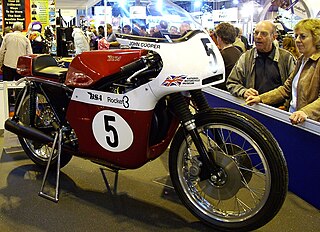
The BSA/Triumph racing triples were three cylinder 750 cc racing motorcycles manufactured by BSA/Triumph and raced with factory support from 1969 to 1974. There were road racing, production racing, endurance racing and flat track variants. The machines were based on the road-going BSA Rocket 3/Triumph Trident.

The Norton Interpol was a police motorcycle produced by the British manufacturer Norton between 1969 and 1976. The Interpol was based on the company's Commando model. The 'Interpol' name was retained for Norton's later Norton Interpol 2 rotary engined police motorcycle.
The Norton Challenge P86, also known as the Norton Cosworth, is a racing motorcycle designed in 1973 by Keith Duckworth of Cosworth Engineering for Norton Motorcycles. The 750 cc (46 cu in) DOHC vertical twin was essentially two cylinders from Cosworth's world championship winning V8 DFV Formula One engine. A road going version was intended to be a replacement for the Norton Commando. Four complete machines and around 30 engines were made before the project was cancelled due to the financial collapse of NVT.












